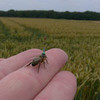Boosting agricultural production in Africa, using data to drive efficiencies in UK farming, and improving understanding of the plant microbiome are three key issues being addressed at a major conference next week.
Boosting agricultural production in Africa, using data to drive efficiencies in UK farming, and improving understanding of the plant microbiome are three key issues being addressed at a major conference next week.
The Rothamsted Open Innovation Forum (ROIF), which will be held from 18-20 January, is attracting industry leaders from around the world to try and provide solutions to global food challenges. “It’s clear from the range of pre-competitive pitches we’ve received that the breadth of topics the forum will cover will be extremely broad,” says Chris Dunkley, chief executive of Rothamsted Centre for Research and Enterprise. “Day three of the event will bring industry champions together to discuss everything from crop science to agronomy and data - giving everyone from farmers to scientists the chance to get involved with the big opportunities in global food security.”
Five key challenges will shape the day, kicking off with social acceptance of crop protection technologies; a key issue here in the UK. It will then move on to improving knowledge about African soils and landscapes to help focus agronomic advice on the most productive areas. A group of potential collaborators will work through each of the challenges.
“By bringing together international representatives from across the agri-food supply chain, ROIF 2017 is a game-changing way of fast-tracking answers to some of the biggest global questions,” explains Mr Dunkley. “With technology ever evolving, this unique event will be crucial for sharing knowledge and expertise across the entire agricultural community.”
The Centre for Agriculture and Biosciences International (CABI) is hoping to bring together an alliance of researchers at the event to boost understanding of the plant microbiome, leading to enhanced crop health and productivity.
And from Syngenta’s perspective, improving the use and security of agricultural data is a fundamental challenge which could, if overcome, enable more effective decision-making at farm level while also driving organisational and sector change across the globe. “Farm data is very topical with so much being generated, but turning it into something usable is critical,” says Mr. Dunkley. “The internet is becoming an increasingly powerful tool for agriculture. Now more than ever it’s crucial for the best minds in the industry to share their knowledge and expertise to promote a data revolution.”
With a background in cutting-edge research, Rothamsted is the perfect host for such an event, which will feed into real change on the ground and an industry white paper to record best practice and ongoing projects for the year ahead. “Open Innovation has undoubtedly speeded up the development of new products and services in other sectors, and now we are excited to be using it to benefit British and global agriculture, which is so vital to all of humanity,” says Mr Dunkley.
Chairing the first day of the event will be BBC Farming Today’s Charlotte Smith, with day two featuring keynote speaker Christian Witt from the Bill and Melinda Gates Foundation, and a ministerial address from George Freeman MP.
Contacts
Notes to Editors
For further information or to book tickets, please visit www.roif.co.uk.
For any media enquiries please contact Olivia Cooper, partner at Agri-hub: The agri-media professionals. Tel: 01392 840009 or email olivia@agri-hub.co.uk.
About Rothamsted Centre for Research and Enterprise (RoCRE)
The Rothamsted Centre for Research and Enterprise, RoCRE, is a new and unique hub focused on promoting collaboration and innovation by partnering with commercial agricultural technology businesses and opening up the research process. RoCRE is part of the historical Rothamsted Research campus located in the beautiful Hertfordshire countryside. RoCRE offers a range of facilities, including state of the art conference facilities, flexible laboratory space, and business incubation units, providing exciting opportunities for your business to thrive.






